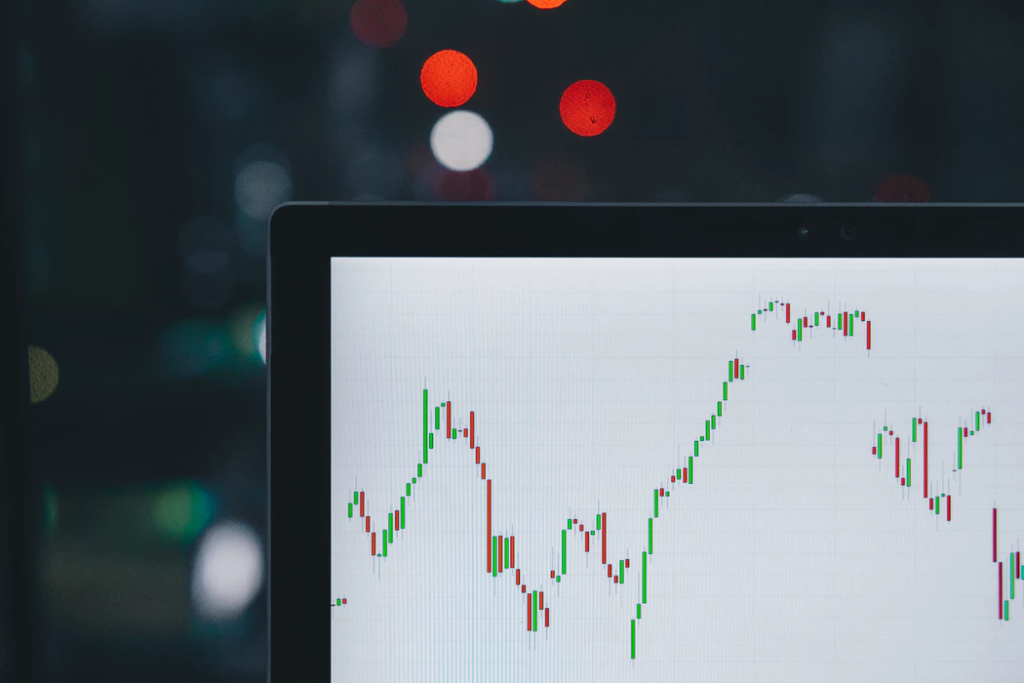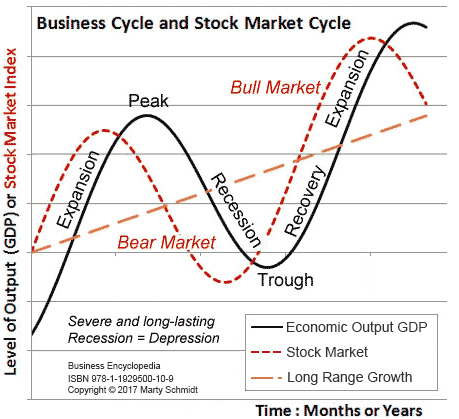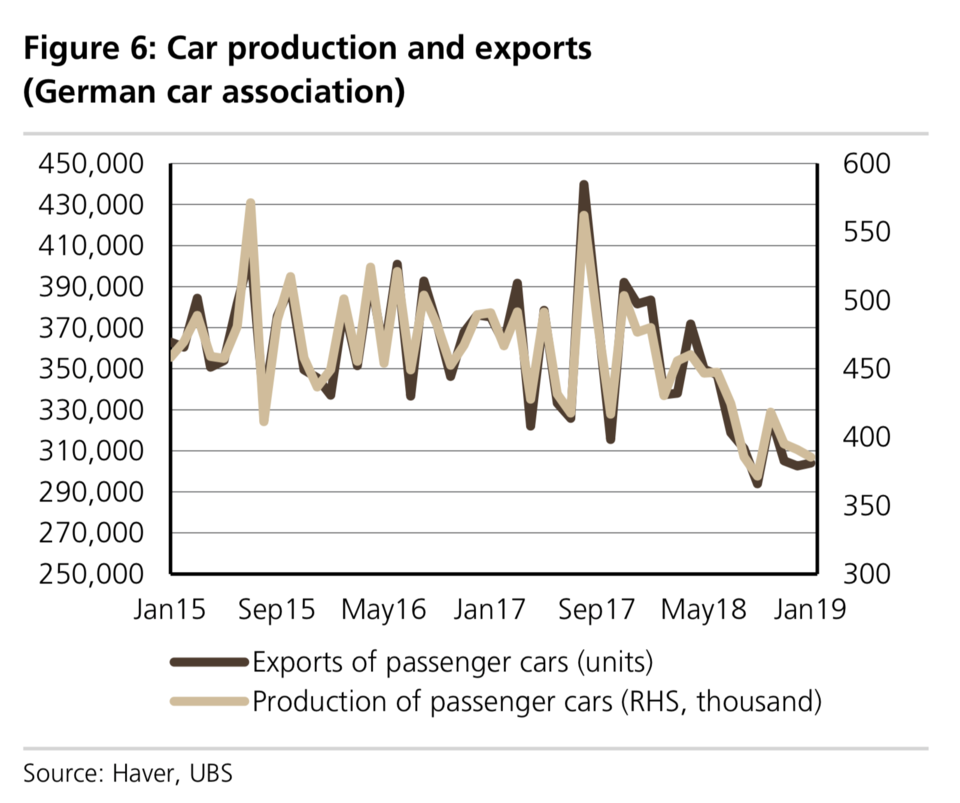
Recession. The word often conjures up thoughts of fear and chaos. Recessions don’t only affect the global and local economy, but also investors, who can lose significant sums of money during such periods of time. To understand recessions, you must understand the cyclical nature of markets, previous recessions, and how certain factors play a role in the downward swing of an economy.
What is a recession?
Contrary to popular belief, economies are not always growing at a steady pace. There are periods of economic expansion and contraction, which ebb and flow constantly. A period of extreme economic growth is a welcome sign for businesses and consumers alike, while a period of economic contraction is cause for concern.
A technical recession is defined as a period of economic decline when GDP growth falls over two successive quarters. Such an economic climate displays signs that the economy is on a downswing and businesses are contracting their operations. An actual recession is harder to define, but most economists agree it occurs when there is a significant economic decline across an entire economy lasting for more than a few months. While this definition is more abstract, a recession is quite evident when it hits an economy, as it affects all aspects of business and consumers lives.
Causes of recessions
There is much to be said about why a recession occurs. Some believe it is in the natural cycle of markets to fall in and out of recession regularly, while others attribute recessions to specific economic and financial factors that weigh down economies.
Recessions can be caused by the bubble bursting in a specific asset class. When there is significant demand for a specific asset, buyers will come in and drive the price upward. As long as buyers believe the asset will rise in value, its price will continue to soar. Eventually, the asset might lose its value, or investors will realize that the price has been driven up too high, at which point a major sell-off will occur and the value of the asset will quickly drop.
This is exactly what happened in the 2008 mortgage crisis, when the derivatives market underlying home mortgages were thought to be bulletproof, until it was found that a significant number of mortgage holders could not pay their debts due to rising interest rates. This caused massive defaults in home mortgages, and with it, a collapse in the housing and financial markets almost overnight.
Recession cycles
When an economy hits a period of prolonged expansion, it is not uncommon for inflation to rise. At some point, the economy will have no more room for growth in its current iteration and hit a peak. As prices rise, demand from consumers will fall, causing businesses to start cutting their production and reducing employment. This cascading effect of higher unemployment and a reduction in consumer demand followed by business contraction is what ultimately leads to an economic recession.

While business cycles can be predicted to some degree, their duration and magnitude cannot. Over time a variety of business cycles have brought recessions of varying degrees. The 2001 post-dot-com recession was short, lasting only 8-months following a quick rise in internet-based businesses. On the flipside, the Great Depression in the United States was devastating, lasting about 10-years and creating 25% unemployment in the country.
Based on historical business cycles, markets are long overdue for a recession. On average, the global economy is in expansion for just over 3-years in each cycle. Today, the economy has been in economic expansion for over 9 years, a significant period of time given the general business cycle. The latest recession in 2008 is now over a decade ago, meaning, it is not unreasonable to think another recession is waiting in the wings.
Examining the next potential recession
Many experts believe the next global recession is soon at hand. There are several geopolitical factors that also play into a potential recession. Britain’s exit from the European Union has brought to the surface fears of more countries venturing out on their own, and ultimately breaking the balance of power in the region.
The rise of nationalist parties in Europe threatens to separate long-standing allegiances between nations, and hurt global trade and cooperation. In this scenario, European countries could be left to fend for themselves, lacking any backing from their peers in the region.
As United States President Donald Trump continues his trade war tactics with nations like China, the global economy is suffering. Trump has already instituted 25% tariffs on $200 billion of Chinese goods exported to the US and has shown no signs of backing down.
In fact, recessions have already hit several nations, a possible sign of things to come for the global economy. Italy has found itself in recession territory, with the country’s GDP shrinking due to egregious levels of debt. Meanwhile, in Germany, analysts believe the country could be in a recession by the end of 2019. The country was on the verge of a recession after its fourth-quarter GDP came in completely flat, narrowly missing the contraction which would have labeled the country in a recession. It’s expected that on the year as a whole Germany’s economy will only grow 1.1%, leaving not much margin of error. Overall, the entire eurozone is struggling to find its footing, putting it in a precarious position heading into the rest of 2019.
Have we learned our lessons?
The 2008 global recession was fueled by the US subprime mortgage market, which brought the financial world to its knees. While we would like to think the economy learned its lesson, it appears there are similar trends to the mortgage crisis that are emerging today. Take, for instance, the car financing industry. More than 7 million Americans have gone into delinquency on their car loans. In fact, these delinquency levels mirror those during the financial crisis a decade ago. This has caused hesitation by the Federal Reserve to raise US interest rates.
Meanwhile, in Europe, car buying has decreased by 10%. In Germany this has been especially damning, with new car production and exports falling substantially, putting downward pressure on the country’s economy. Oxford analyst Stephen Foreman noted this issue. “Particularly vulnerable would be the German and Spanish industries, with output falling 0.6 ppt and 0.8 ppt below baseline over the same period,” he said.

The confluence of these geopolitical and financial factors points to a world on the precipice of recession. However, recessions don’t have to cripple your finances. If you play your cards right, you could even come out of a recession financially stronger than before.
They aren’t all bad
For those who can anticipate a recession, there is money to be made. The financial world is a zero-sum game, meaning, when one party loses money, another party makes money. This makes it extremely important to not panic during a recession. By playing it cool, you can often find ways to make money in these times.
However, playing a recession correctly takes a significant amount of financial savvy and anticipation. For instance, immediately following the world’s last recession in 2008, many millionaires saw their wealth skyrocket. These individuals were able to recognize suppressed market prices as opportunities to add assets at low prices, and turn significant profits when the market recovered shortly thereafter. This was done by diversifying investment across a wide range of assets, and not settling for low-interest savings accounts. If you want to take a note out of this playbook it will require you to have access to cash and/or liquid investments at all times, ready to pounce on underpriced assets when the market goes into a recession.
One notable figure who has always seemed to find a way to make money during recessions is Warren Buffet. Buffet noted how the key to coming out on top during a recession is to, “be fearful when others are greedy, and be greedy when others are fearful.” Following the most recent recession in 2008, Buffet used his stockpiles of cash to buy assets which he felt were undervalued. This proved to be extremely profitable for the financial guru, as he was able to benefit from a market which scared others away.
You too could find ways to benefit from a recession. Make sure to do your homework and anticipate what assets might become undervalued when economies are in a downtrend. Doing so will allow you to leverage your knowledge to get positive returns when others are fearful of the markets.


